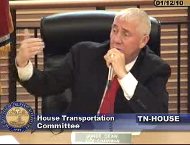1/13/2010
Tennessee Legislature Moves to Legitimize Traffic CamerasTennessee House Transportation Committee endorses existing photo ticketing programs while recommending moratorium on new cameras.

The Tennessee House Transportation Committee yesterday drafted a legislative proposal that will solidify the legal standing for the use of both speed cameras and red light cameras in the state. After a lengthy markup process, committee members approved a two-year moratorium on new cameras while ensuring that there is no disruption in ticketing for cities like Chattanooga, Clarksville, Jonesborough and Knoxville that already have programs in place. In 2008, the state legislature quietly gave the green light to jurisdictions interested in installing red light cameras and speed cameras, but even the lawmakers most in favor of the use of cameras have been pressured by the public to take some action to rein in their use.
"This is a difficult issue for every one of us," Representative Richard Floyd (R-Chattanooga) said. "We've got all of our local governments who want to do this, but if you put it on the ballot and you'd get blown out of the water with it."
One representative calculated that 85 percent of the public was against cameras, and photo enforcement's primary legislative advocate, Vice Chairman Vince Dean (R-East Ridge), agreed.
"As has been stated, the public don't like these [cameras]," Dean said.
Over the past few months, city officials have mounted an unprecedented lobbying campaign to convince lawmakers to side with them over their constituents. The Transportation Committee devoted the vast majority of its time listening to these officials, giving far more limited and unfavorable time slots to just two members of the public to speak. As a result, the committee will impose no restrictions whatsoever on cities with existing photo enforcement contracts. A temporary moratorium would prevent new cities or counties from starting new programs, but there is no penalty for jurisdictions that rush to sign a contract before the proposal is signed into law, as several Texas cities did last year. Local jurisdictions -- with the special exception for the lucrative "S-Curve" cameras in Hamilton County -- would not be able to renew their contracts. Dean's introduction of the S-Curve exemption raised some controversy.
"This reeks of Nebraska coming out of the health bill," Representative Ben West Jr (D-Hermitage) said, explaining his support for the move. "But I'll second yours and I'll take that as a commitment that one day you'll second me concerning Nashville."
The proposed bill would ask the state comptroller to audit existing camera programs to ensure all money is properly accounted for. Beginning in 2012, the state transportation department would verify that all reasonable engineering solutions have been attempted before the installation of any new automated ticketing machines. Cities would no longer be allowed to charge more than $10 in court fees. Attempts to direct all profit from photo ticketing programs to trauma centers failed as did a move to ban speed cameras on state highways.
Committee staff are expected to finalize the legislative language for a committee vote prior to House action on the measure.


